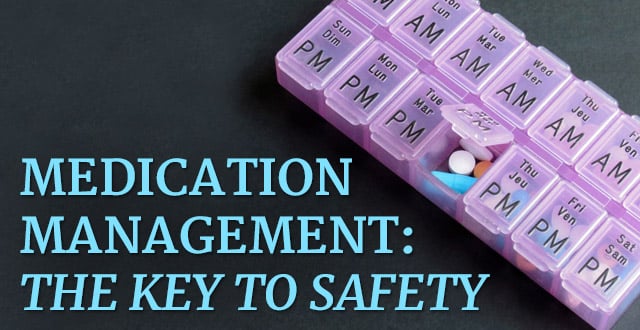Advances in medicine and early diagnosis have allowed Americans to lead longer and more productive lives. High blood pressure, diabetes, glaucoma and other chronic diseases can now be more easily managed by medications.
According to research, most people 65 years and older have at least one chronic health condition and are likely to take multiple medications. In fact, the average senior, age 80-84, takes approximately 18 prescriptions per year.
Sadly, research has found that fifty-eight percent of all older adults make some kind of error when taking their medications. Even more alarming is the fact that 26 percent of these errors can have potentially serious consequences. The Centers for Disease Control and Prevention warns that medication error and related adverse drug events continue to be a major safety concern for seniors who are self-administering prescription medications.
Proper medication management is especially important to those who may be taking multiple pills or have frequent changes in prescriptions.
From pill organizers to a master list of medications, there are several simple steps one can take to reduce potential medication-related harm.
• Make sure all physicians are aware of each medication currently being taken.
• Read and follow all medicine precautions, paying special attention to side effects. Even medications that cause dizziness should be taken with caution as a fall can lead to serious injuries or even death.
• Take medications only as prescribed (with food, on an empty stomach, every four hours, etc.).
• Try to use one pharmacy for all prescriptions and over-the-counter medications to ensure there is a complete list of all medications on file.
• Do not discontinue use of a medication without specific instructions from doctor. People often stop taking antibiotics once they begin to feel better but this can be a potentially dangerous mistake.
• Properly dispose of expired medications as the drugs can begin losing their potency.
• Do not take medications that were prescribed to someone else even if you are exhibiting the same symptoms.
• Consider requesting a medicine spoon from the pharmacist to measure medications such as cough syrup. It’s tempting to reach for the kitchen spoon but be advised that study after study continues to show this method often leads to under-dosing or overdosing.
• Store medication according to the manufacturer’s recommendation—some may require refrigeration.
• Keep all medications away from young children who may be visiting. While it may be convenient to store a pill organizer on a nightstand, it also provides easy access for grandchildren and great-grands. Be sure to put pills in a location that isn’t accessible to pets too.
Although the Internet can certainly offer a wealth of information about medications and provide you with the ability to check your symptoms online, if you have questions about your prescription(s) or overall health, it is imperative that you ask your doctors and/or pharmacists. They know your personal medical history and will be your most valuable asset in preventing an adverse reaction.

